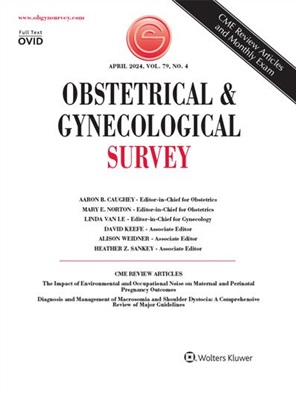Heparin for Women With Recurrent Miscarriage and Inherited Thrombophilia (ALIFE2): An International Open-Label, Randomized Controlled Trial
IF 3.6
4区 医学
Q1 OBSTETRICS & GYNECOLOGY
引用次数: 0
Abstract
ABSTRACT Thrombophilia has been implicated in the cause of recurrent miscarriage, which affects approximately 3% of couples trying to conceive. International professional guidelines recommend heparin anticoagulation for antiphospholipid syndrome, an acquired thrombophilia responsible for approximately 15% of recurrent miscarriage, but not for other inherited thrombophilias due to an absence of evidence. Many clinicians prescribe heparin to women with recurrent miscarriage and inherited thrombophilia despite the professional recommendations. This international, open-label, randomized controlled trial aimed to compare the effect of low-molecular weight heparin (LMWH) and standard pregnancy surveillance on livebirth rates in women with recurrent miscarriage and inherited thrombophilia. Women aged 18–42 years with recurrent miscarriages who were attempting to conceive or less than 7 weeks pregnant and had an inherited thrombophilia were recruited across 40 hospitals in 5 countries. Women were randomly assigned to LMWH or no LMWH in a 1:1 ratio. Women randomized to LMWH self-administered it once a day subcutaneously, beginning as soon as possible after a positive pregnancy test and before 7 weeks of gestation and continuing throughout pregnancy. The primary study outcome was livebirth after 24 weeks of gestation. Livebirth was compared across randomized treatment groups using an χ 2 test with continuity correction, then a sensitivity analysis with logistic regression to adjust for stratification factors. A total of 326 women were randomized between August 2012 and January 2021. Of these, 164 were randomized to LMWH plus standard care and 162 to standard care alone. In the standard care group, 30 patients ultimately received LMWH for thromboprophylaxis per professional treatment guidelines. The mean age of participants was 33 years, and the median number of miscarriages before randomization was 3 (interquartile range, 2–4), with two thirds of patients having a history of 3 or more miscarriages. The most common thrombophilia diagnoses were heterozygosity for factor V Leiden, prothrombin G20210A mutation, and protein S deficiency. The livebirth rate was 72% (116/162) in the LMWH group, and 71% (112/158) in the standard care group, and no statistical significant was detected between the groups even after adjustment (odds ratio, 1.08; 95% confidence interval, 0.65–1.78; P = 0.77). No differences in adverse pregnancy outcomes or complications were observed between the groups. Easy bruising was reported by 45% (73) women in the LMWH group and 10% (16) in the standard care group. This randomized controlled trial demonstrates that although LMWH is safe in women with recurrent pregnancy loss and inherited thrombophilia, it does not result in an increased live birth rate compared with standard pregnancy surveillance.肝素治疗复发性流产和遗传性血栓形成(ALIFE2):一项国际开放标签随机对照试验
血栓病与复发性流产有关,约有3%的夫妇试图怀孕。国际专业指南推荐使用肝素抗凝治疗抗磷脂综合征,抗磷脂综合征是一种获得性血栓性疾病,约占复发性流产的15%,但由于缺乏证据,不建议用于其他遗传性血栓性疾病。许多临床医生不顾专业建议,给反复流产和遗传性血栓形成的妇女开肝素。这项国际、开放标签、随机对照试验旨在比较低分子肝素(LMWH)和标准妊娠监测对复发性流产和遗传性血栓形成妇女的活产率的影响。在5个国家的40家医院招募了年龄在18-42岁、有复发性流产、试图怀孕或怀孕少于7周且患有遗传性血栓形成症的妇女。女性按1:1的比例随机分配低分子肝素组和非低分子肝素组。随机分配到低分子肝素组的妇女在妊娠试验阳性后和妊娠7周之前尽快开始,并持续整个妊娠期间,每天皮下给药一次。主要研究结果是妊娠24周后的活产。采用连续性校正的χ 2检验比较各随机治疗组的活产,然后采用logistic回归进行敏感性分析以调整分层因素。在2012年8月至2021年1月期间,共有326名女性被随机分配。其中,164例随机分配到低分子肝素加标准治疗组,162例随机分配到单独标准治疗组。在标准治疗组,根据专业治疗指南,30名患者最终接受低分子肝素预防血栓。参与者的平均年龄为33岁,随机分组前流产的中位数为3次(四分位数范围为2-4),其中三分之二的患者有3次或以上的流产史。最常见的血栓病诊断为Leiden因子V杂合性、凝血酶原G20210A突变和蛋白S缺乏。低分子肝素组的活产率为72%(116/162),标准护理组的活产率为71%(112/158),调整后两组间差异无统计学意义(优势比1.08;95%置信区间为0.65-1.78;P = 0.77)。在不良妊娠结局或并发症方面,两组间无差异。低分子肝素组中有45%(73)的妇女易出现瘀伤,标准护理组中有10%(16)的妇女易出现瘀伤。这项随机对照试验表明,尽管低分子肝素对复发性妊娠丢失和遗传性血栓形成的妇女是安全的,但与标准妊娠监测相比,它不会导致活产率增加。
本文章由计算机程序翻译,如有差异,请以英文原文为准。
求助全文
约1分钟内获得全文
求助全文
来源期刊
CiteScore
2.70
自引率
3.20%
发文量
245
审稿时长
>12 weeks
期刊介绍:
Each monthly issue of Obstetrical & Gynecological Survey presents summaries of the most timely and clinically relevant research being published worldwide. These concise, easy-to-read summaries provide expert insight into how to apply the latest research to patient care. The accompanying editorial commentary puts the studies into perspective and supplies authoritative guidance. The result is a valuable, time-saving resource for busy clinicians.

 求助内容:
求助内容: 应助结果提醒方式:
应助结果提醒方式:


